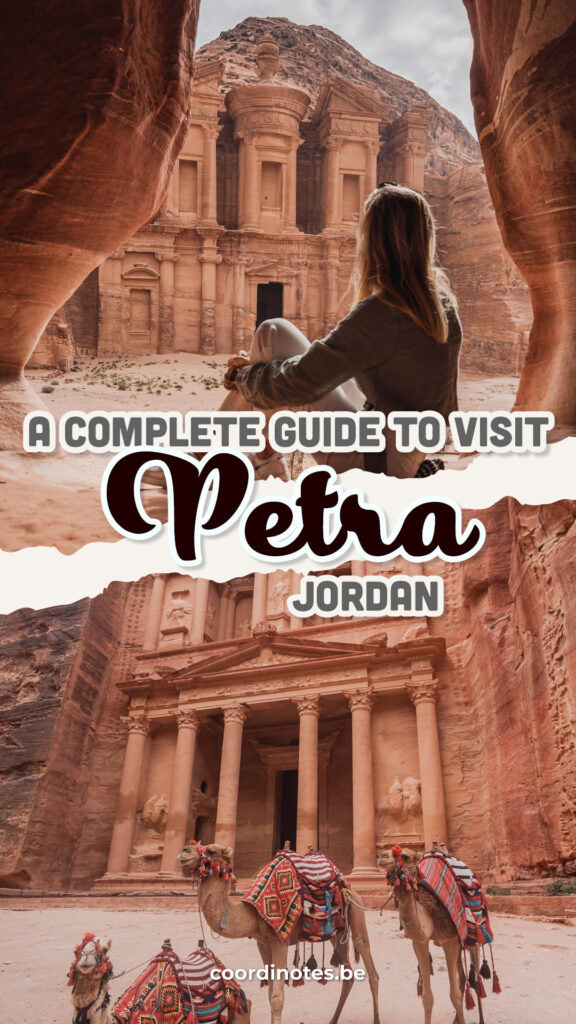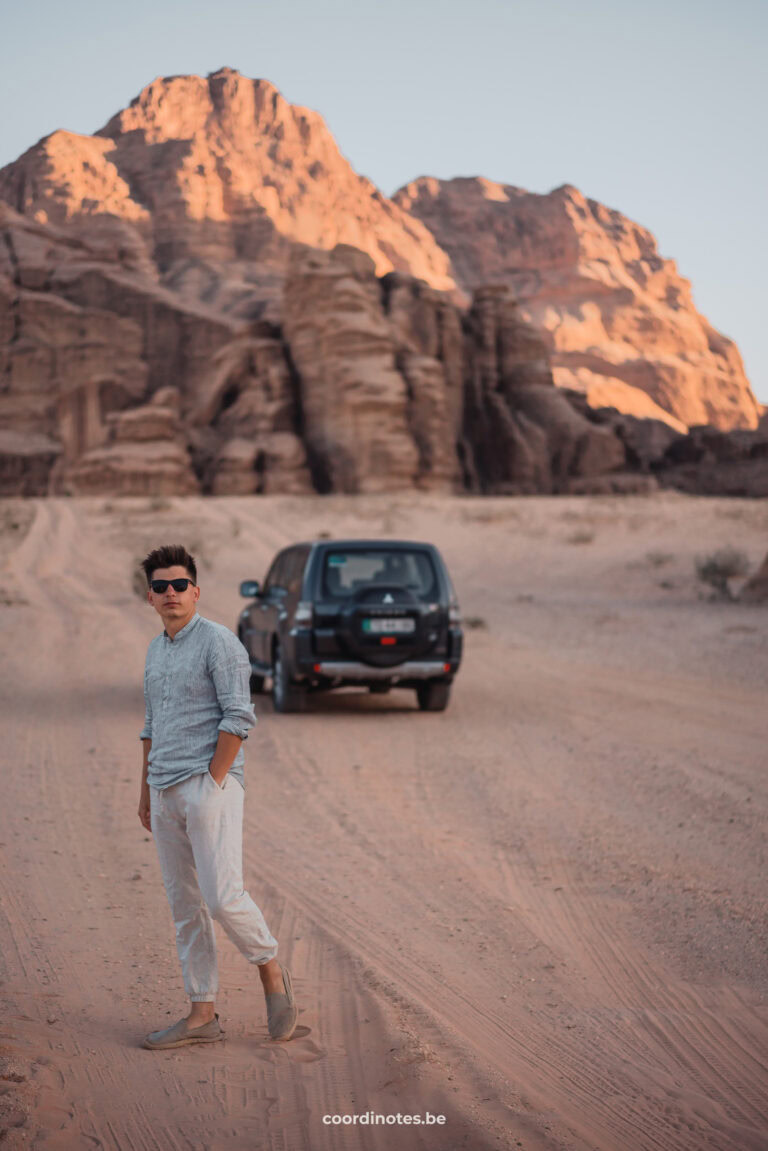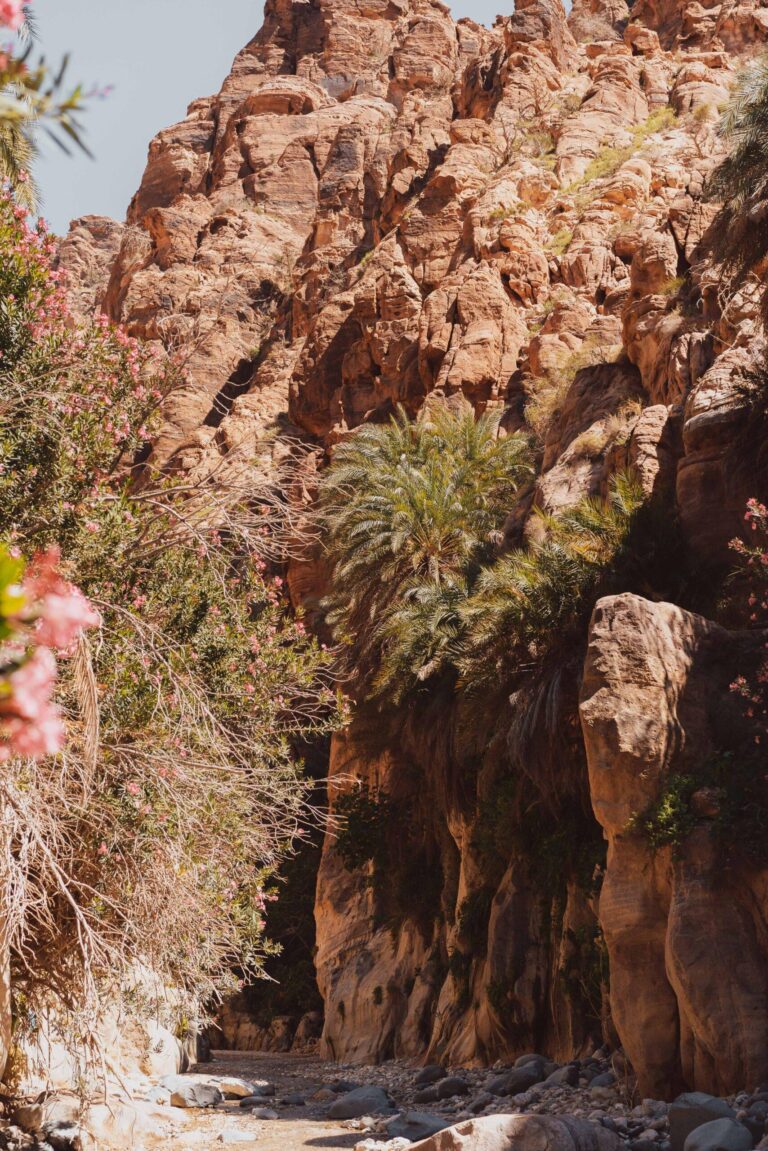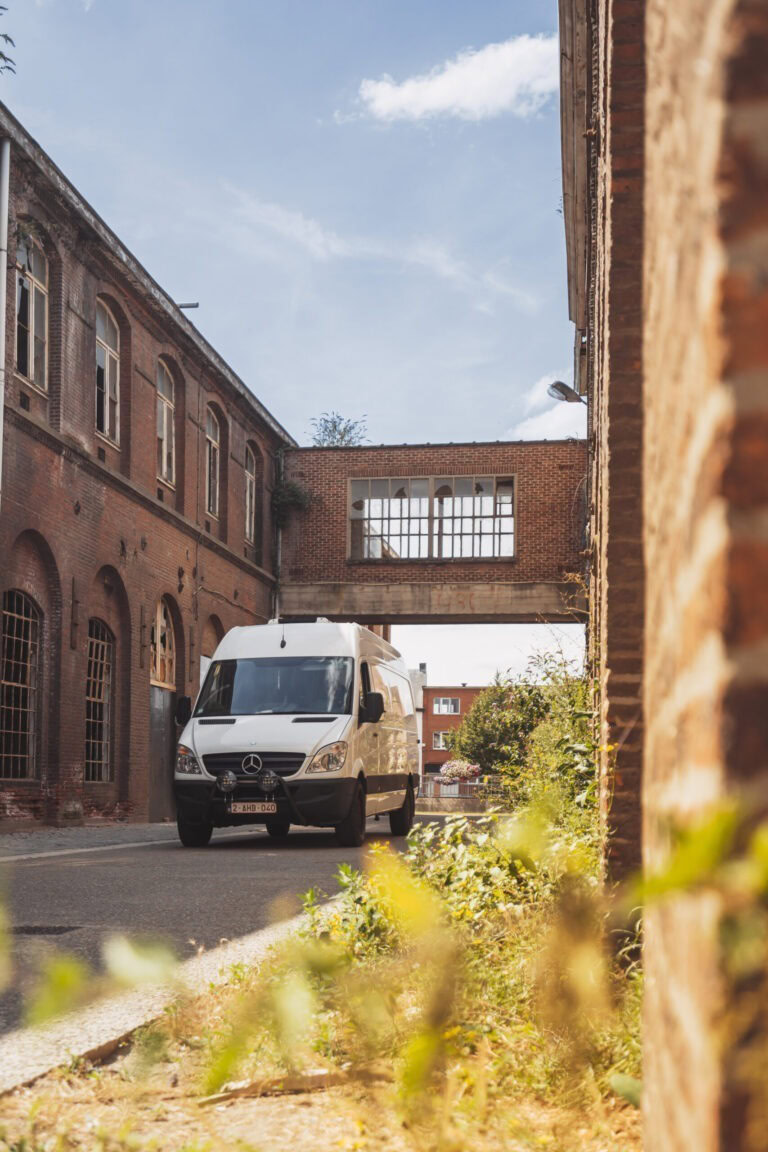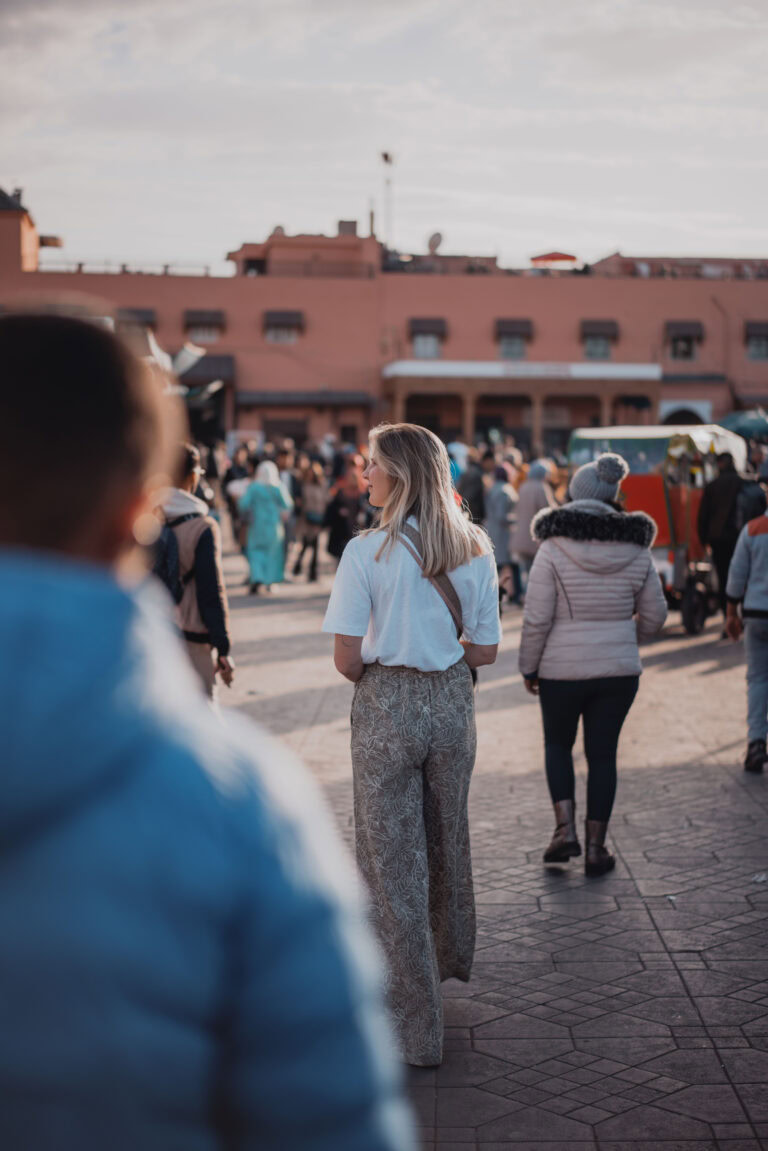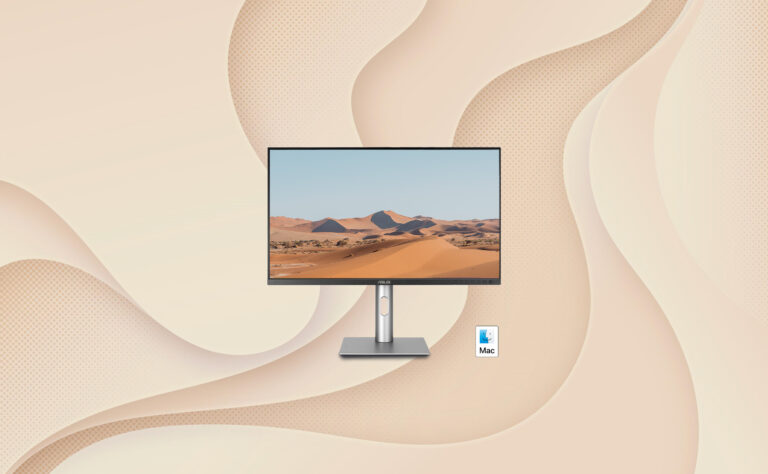Overview
This post may contain affiliate links, which means we may receive a small commission, at no extra cost to you, if you make a purchase through our link.
This is a free way to support us and allows us to continue creating even more inspiring travel guides. Thank you for supporting the love we put into Coordinotes!
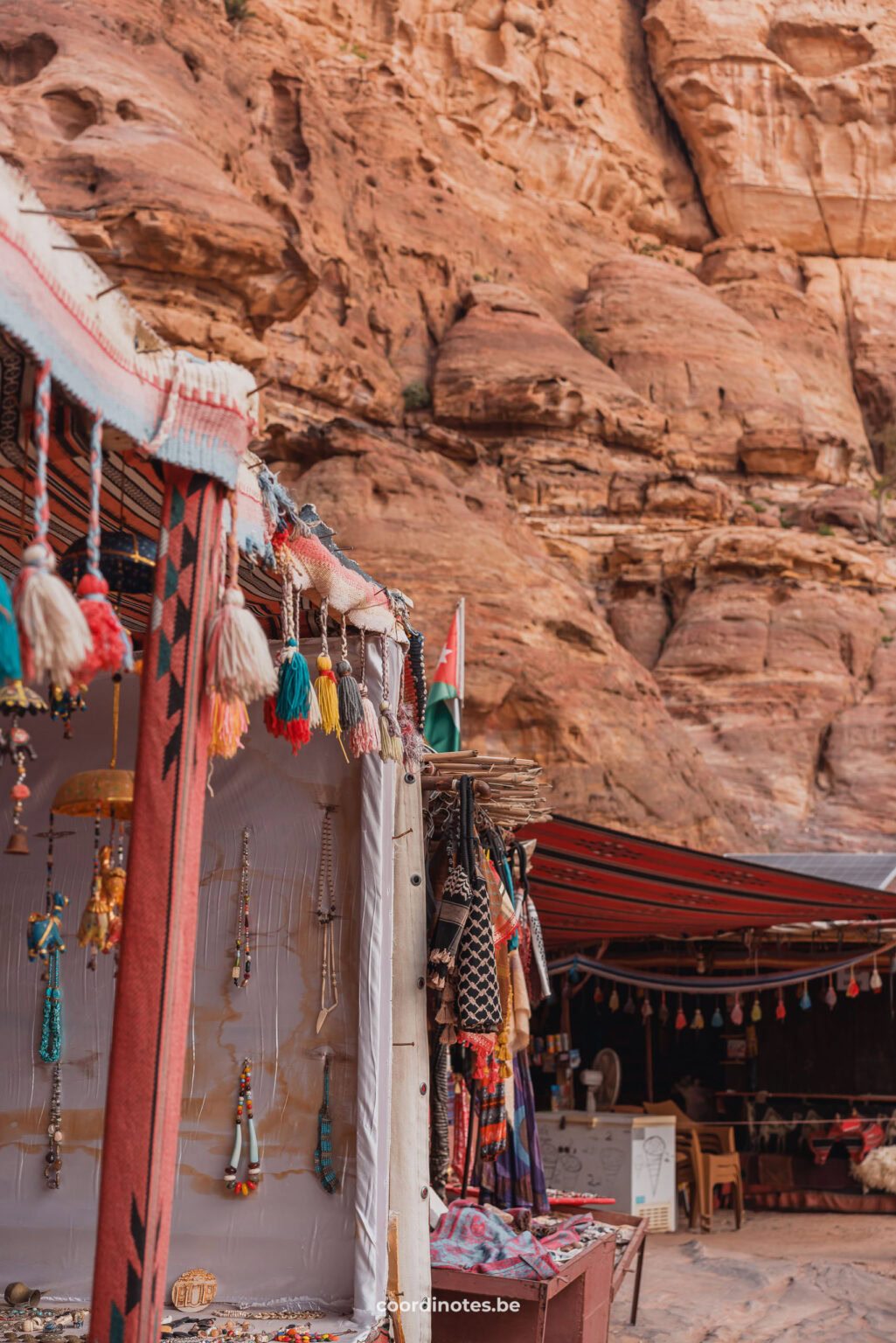
About Petra
Petra is an ancient city with a fascinating history, located in the deserts of Jordan. This archeological site is sometimes called the ‘lost city’ and is full of incredible architecture from the past. People have been living there since around 9000 BC, and it became the capital of the Nabataean Kingdom in the 4th century BC. The city’s buildings are carved into reddish rocks and look absolutely stunning. The Treasury, the famous monument with fascinating carvings, is the absolute highlight. Petra also has many temples, tombs, and an amphitheater to explore.
What’s even more impressive is how the people of Petra managed to bring water to the city in a desert environment. They built a smart system of channels, cisterns, and dams to collect and store water. This helped the city thrive despite the dry surroundings.
Throughout history, Petra faced challenges like invasions and earthquakes, which caused it to decline and be forgotten. Eventually, it was lost and only known to the local Bedouin communities. It wasn’t until the 19th century that the city was rediscovered.
Nowadays, Petra is a UNESCO World Heritage Site and one of the New Seven Wonders of the World. That’s why visiting Petra in Jordan is on the bucket list of many travelers.
Interesting fact
Only 15% of all of Petra has been discovered. So there are still a lot of temples, facades, tombs and ruins that have not yet been found and are still buried under the sand.
Practical
Advertising
Things to do in Petra
The Treasury
The Treasury, known as Al-Khazneh in Arabic, is one of the most iconic structures in Petra. It is entirely carved out of the rose-colored sandstone cliffs and is kind of the symbol of this ancient city. It is the first building you see when you enter Petra through the gorge, called the Siq.
Despite its impressive facade, the Treasury’s interior is relatively simple and consists of a single chamber. The Treasury gets its name from a legend, that suggests it was once a hiding place for treasures. Its original purpose remains somewhat of a mystery, with theories ranging from being a tomb for a Nabataean king to being a place for religious rituals or ceremonies.
This imposant structure is approximately 43 meters (141 feet) tall and features a unique blend of architectural influences, including Hellenistic, Egyptian, and Nabataean styles.
The Treasury gained global fame and recognition after being featured in the film “Indiana Jones and the Last Crusade”.
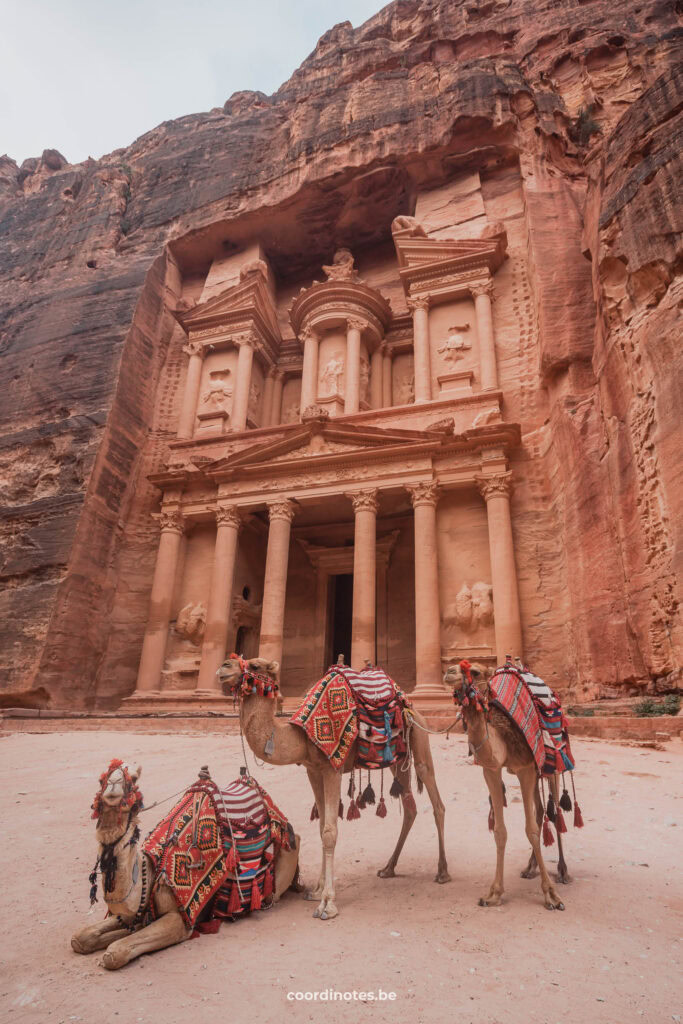
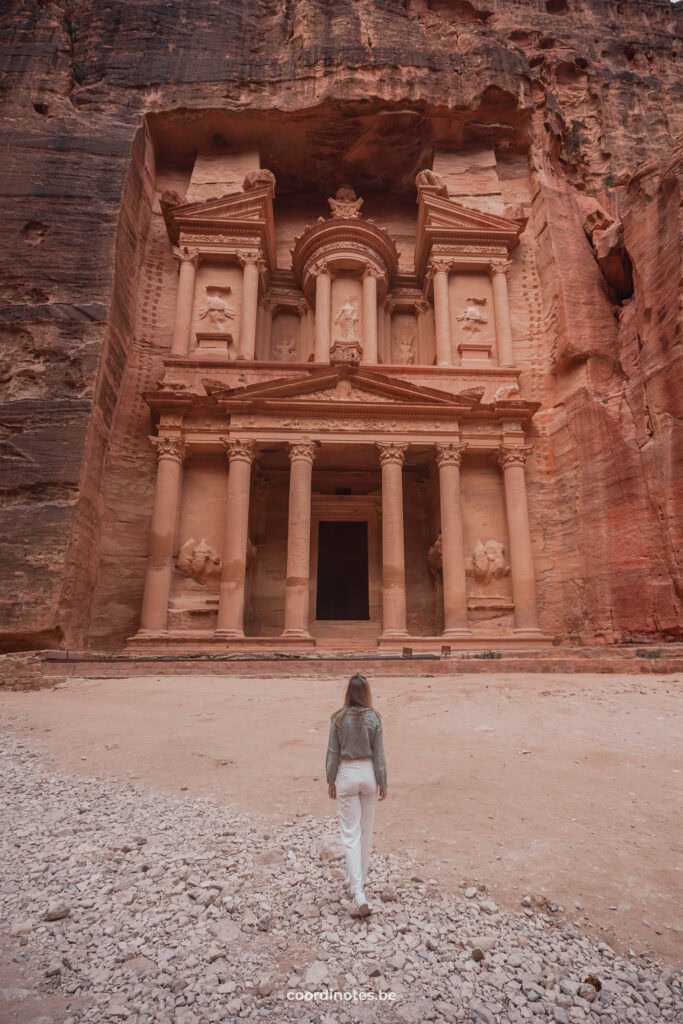
The Monastery
The Monastery is one of the largest monuments in Petra. It is 47 meters wide and 48.3 meters high. It is very similar to the Treasury, with the difference that the upper part comes out of the rocks. Its entrance is beautifully decorated. Inside, you’ll find a peaceful and open space, filled with sunlight shining through small openings.
The Monastery is located in a remote location, perched high on the cliffs of Petra. It takes effort to reach it, but we felt that the experience was more than worth the steep climb.
It is also usually a little less crowded than the Treasury. We liked it at least as much as the Treasury, but maybe that’s because we had it all to ourselves. How? We will tell you later more about that in this blog post.
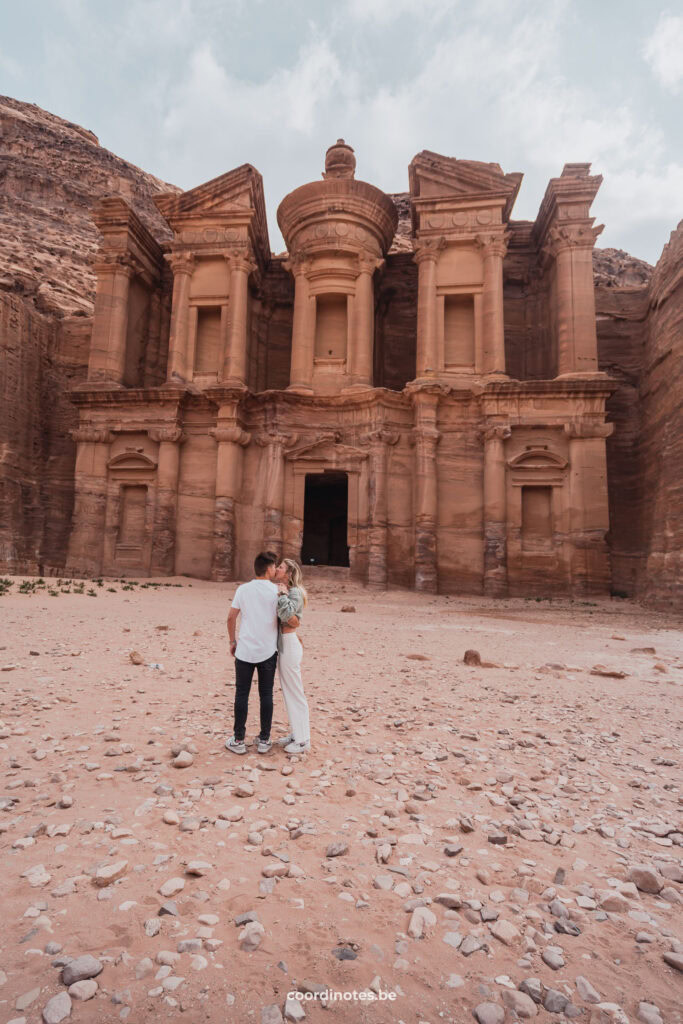
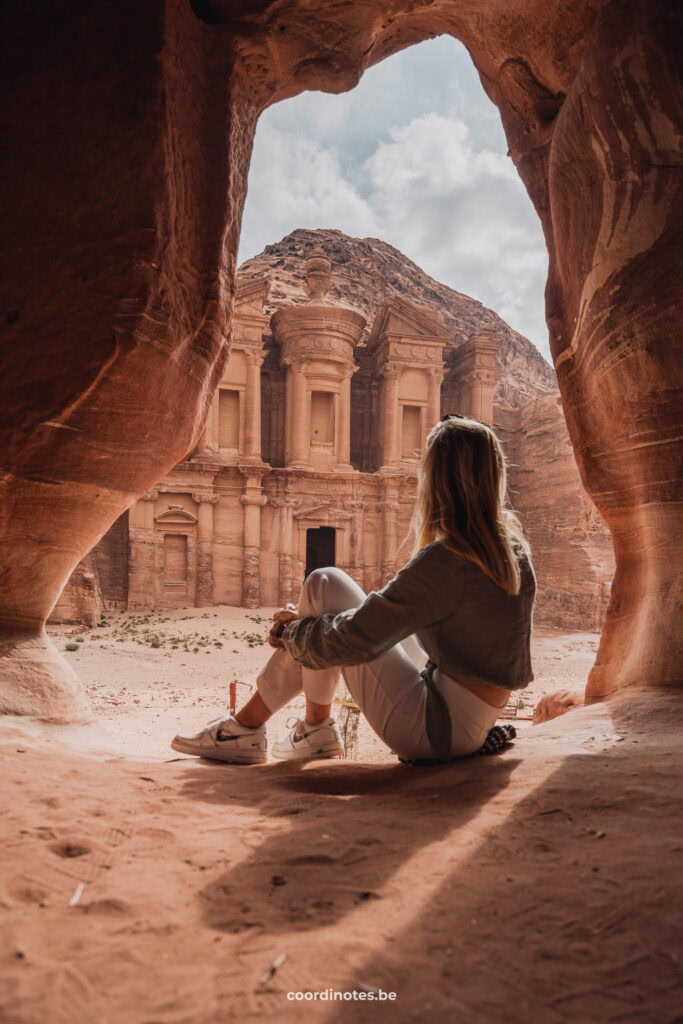
Al Siq
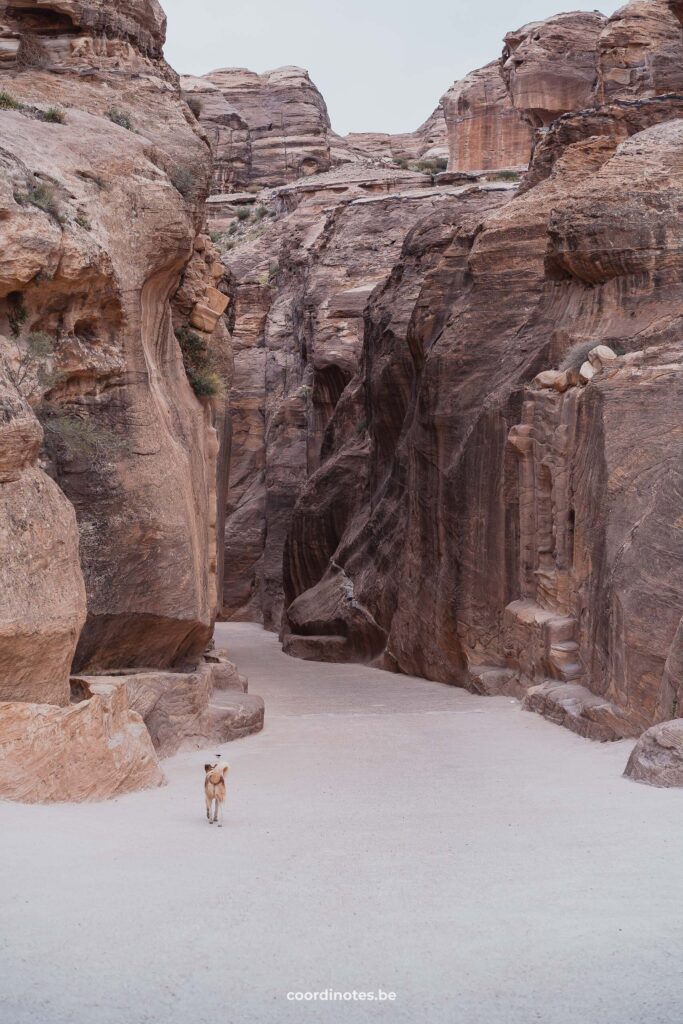
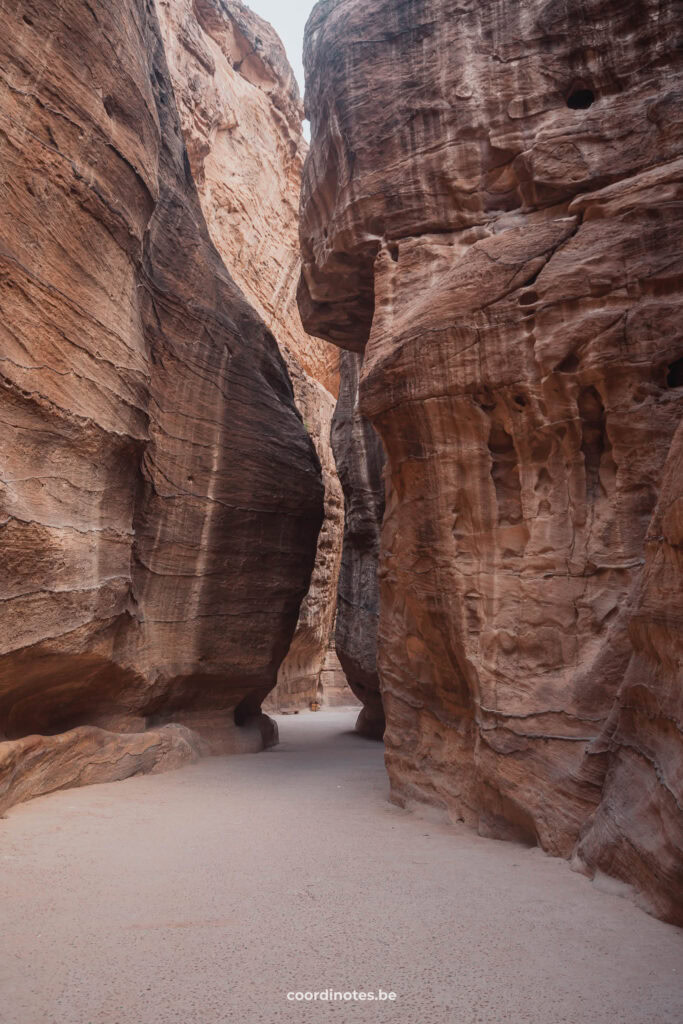
The royal tombs
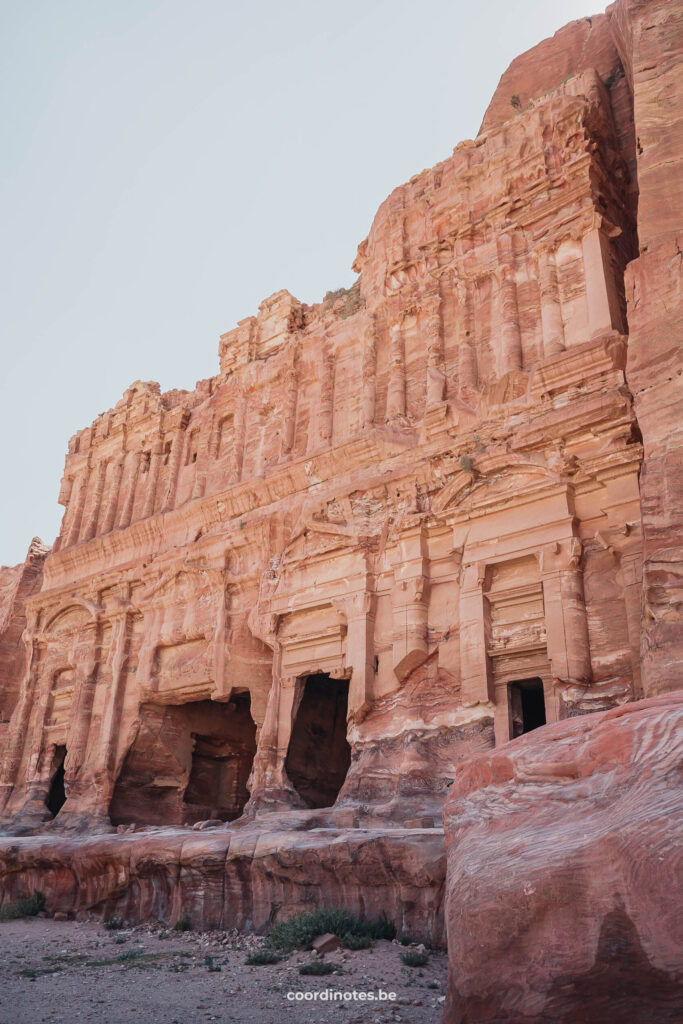
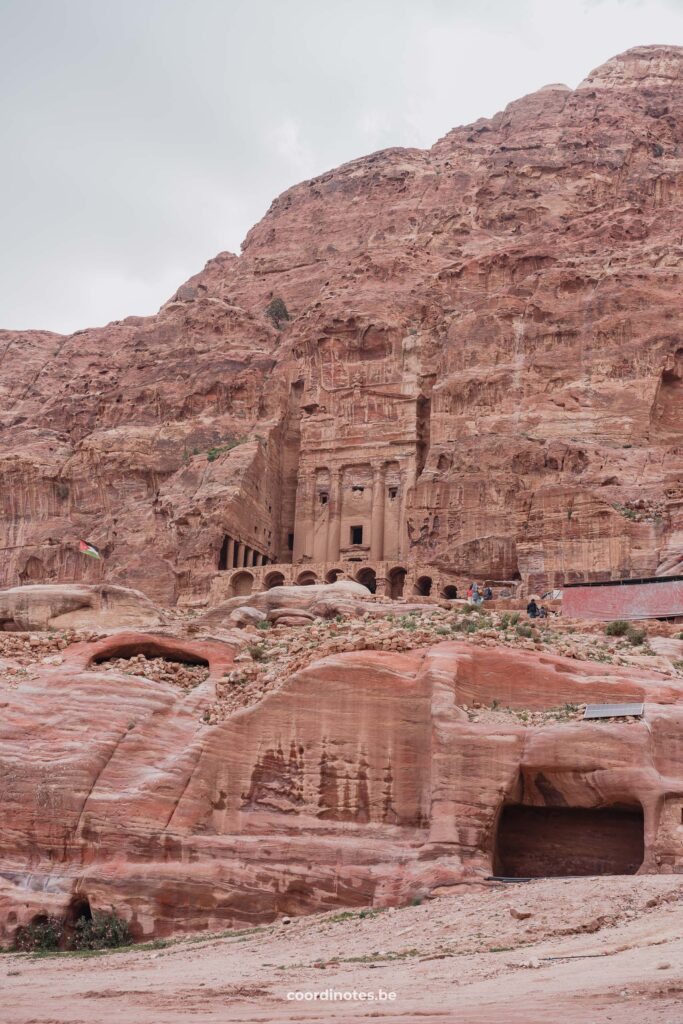
Al-khubtha trail
The Al Khubtha Trail is a beautiful walking trail through the stunning landscapes with some hidden treasures. You hike along breathtaking rock formations and impressive views. You will have to climb a lot of stairs but you’ll be rewarded with a mesmerizing view of the famous Treasury.
The trail also leads to the High Place of Sacrifice, where you can soak in panoramic views of Petra.
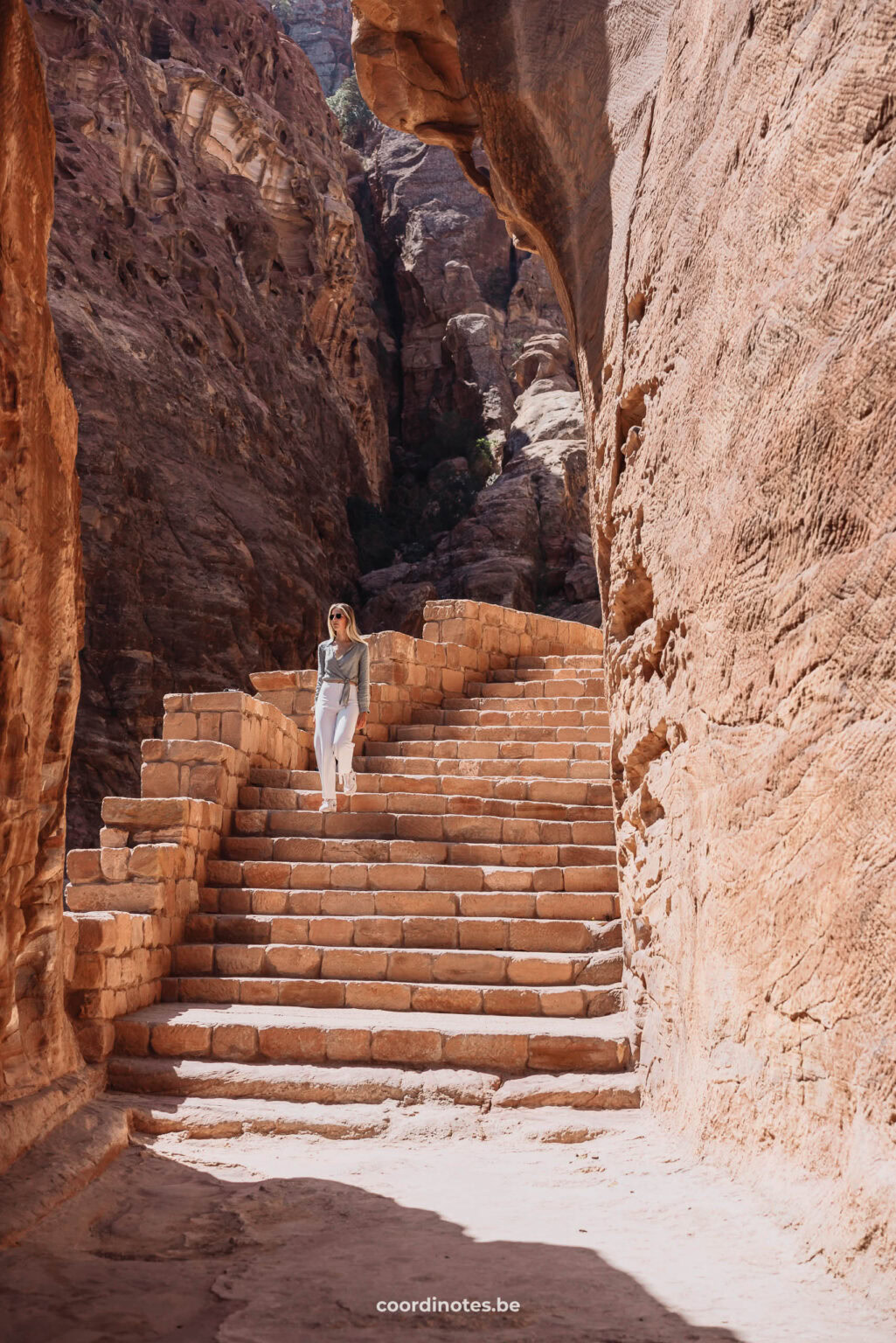
Treasury viewpoint
There is a beautiful viewpoint on top of the cliff right in front of the Treasury. To get there, you’ll have to follow the Al-Khubtha trail. Know that you will have to climb a lot of stairs to get here, but it is really worth it.
The viewpoint is located in the ‘house’ of a local resident. He asks to buy a drink in exchange for entering his house, which we think is a fair deal. The drink was certainly welcome after the tough walk.
Note
There are men walking around at the Treasury, dressed up like Captain Jack Sparrow, asking if you want to go up. Don't follow these men, as they will take you up an illegal trail to another viewpoint that is overcrowded and they'll probably ask for money afterwards. There are signs warning for non-official guide.
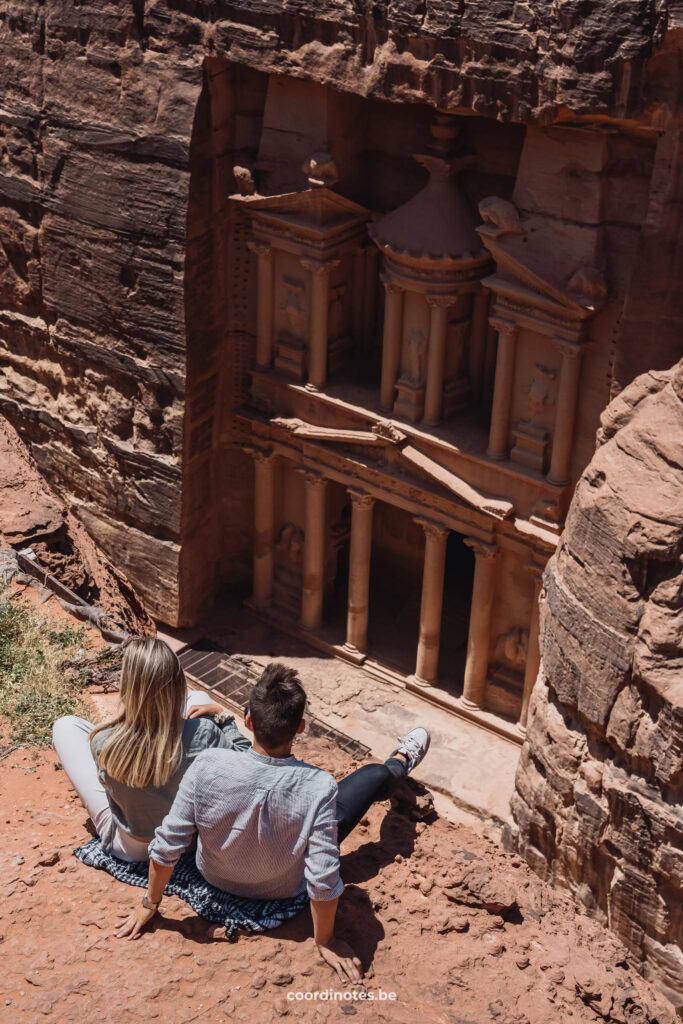
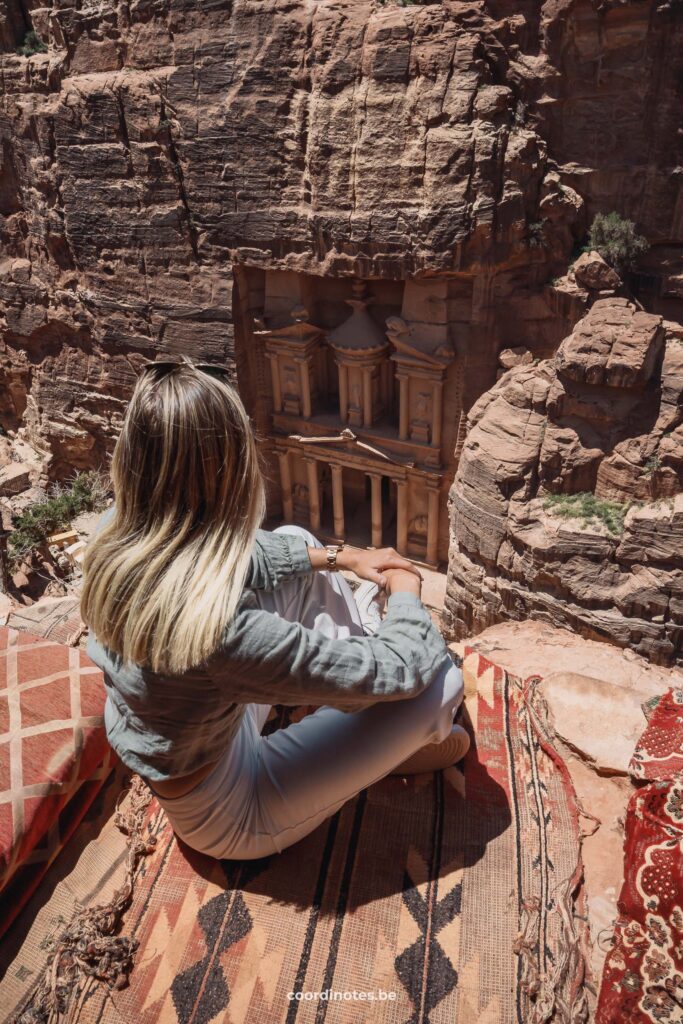
Street of facades
The Street of Facades in Petra is a pathway, lined with impressive rock-cut tombs and intricate facades. As you walk along this historic street, you’ll have the chance to admire the fascinating architecture of the past with some very detailed carvings in the sandstone cliffs.
When you stroll around the site of Petra, it is impossible to miss this place. You almost walk past this anyway, and it is hard to take your eyes off it.
Advertising
How to get there
When you come to Jordan by plane, you will probably land in Amman. To get from Amman to Petra, but also from many other major cities in Jordan, you have several options.
By (rental) car
There are several highways and roads that connect major cities in Jordan to Petra. You can rent a car and drive to Petra, which gives you more flexibility in exploring the region. Here you will find even more useful Jordan travel tips to plan the perfect road trip!
There are two free parking lots where you can park your car. The first parking lot is located next to the visitor center and a second parking lot a bit further in the street. where you can leave your car. Make sure to arrive early, because the paring lot fills up quickly.
By Public Transportation
Public buses are available from various cities in Jordan, including Amman and Aqaba, to Petra. The journey duration and frequency of buses may vary, so it’s advisable to check the schedules in advance.
Organized Tours
Many tour operators offer organized tours to Petra, which can be a great option if you prefer a guided experience with transportation included. These tours often depart from major cities or tourist destinations in Jordan. For example, you can take a day trip to Petra from Amman. However, you can also opt for multi-day trips where you also visit other highlights in Jordan, such as the Wadi Rum.
With Jordan Nomads
The entrance of Petra is located in Wadi Musa, where you will also find the Petra visitor center and the ticket office. Here, you’ll need to purchase or swap your Jordan Pass for an entrance ticket to enter the Petra Archaeological site. From the park’s entrance, you can walk, take a golf cart or take a horse carriage through the Siq, the narrow gorge that leads to the main attractions of Petra. The walk from the entrance to your first glimpse of the Treasury is 2km, and it takes about 20 to 30 minutes before the Treasury looms between the cliffs.
Definitely consider taking a guided tour in Petra. The local guides can provide you with a lot of interesting information about Petra and its fascinating past. On top of that, they can also show you the secret trails and hidden gems of this ancient city.
Note
The animals at Petra are not well cared for and exploited for tourism. We therefore ask you not to support this and not take any horse, donkey or camel rides.
Advertising
Best time to visit Petra
The best time to visit Petra is from March to May and September to November. During these months, you can expect pleasant temperatures and comfortable weather for exploring the ancient city. Additionally, there are fewer tourists during these periods
Summers in Petra can be very hot, with temperatures exceeding 40°C, making it uncomfortable for exploring Petra. Winter months, particularly December and January, can bring colder temperatures and occasional rainfall, which sometimes causes floods in the valley.
To avoid large crowds, it’s recommended to visit Petra during weekdays rather than weekends. Arriving early in the morning or later in the afternoon can also help you experience the site with fewer tourists.
Tip!
It is best to be at the entrance when it opens to avoid the crowd! The large groups usually only arrive from 8 o'clock.
Advertising
Where to stay near Petra
The best place to stay is in Wadi Musa. This is the closest town to Petra and offers a range of accommodations, including hotels, guesthouses, and bed and breakfasts. From Wadi Musa you can easily access Petra Archaeological Park and explore the ancient city. It has a variety of dining options, shops, and services for tourists.
Hotels in Wadi Musa
Discover the best places to sleep through our partners. Book your stay and enjoy their great deals!
Practical tips for visiting Petra
Wear Comfortable Walking Shoes
Petra involves a lot of walking, so it's important to wear comfortable shoes that provide good support. The site is extensive, and you'll be exploring various terrains, including uneven surfaces and stairs. We hiked around 20km that day!
Bring Water and Snacks
It's crucial to stay hydrated, especially during the warmer months. Carry enough water and snacks with you when visiting Petra, because you'll have to walk quite a distance and climb a lot of stairs.
Start Early
We have mentioned this before, but we can't repeat it enough: To make the most of your visit and avoid crowds, it's recommended to start your day early. Arriving at the park when it opens allows you to explore the main sites before they become crowded, and you can also capture beautiful photos in the soft morning light.
Take Your Time
Petra is a huge and remarkable site with many hidden treasures to discover. Plan to spend at least a full day for visiting Petra, if not more. Take your time to soak in the atmosphere, admire the details of the ancient architecture, and explore off the beaten path areas. Another reason to start your day as early as possible.
Bring a Hat and Sunscreen
Check the weather forecast to be prepared. Petra can experience extreme temperatures. Bring sunscreen, a hat and sunglasses to protect yourself from the sun and dress appropriately with respect for the local culture.
Plan to Avoid the Crowds
Petra is a popular tourist destination, so expect some crowds, especially at the iconic sites like the Treasury. If possible, try to visit on weekdays rather than weekends for a potentially less crowded experience.
It is also a good idea to plan your day in advance. Upon entering, we immediately walked to the Monastery after the Treasury. In this way, we had it all to ourselves. After the Monastery, we went to the Treasury viewpoint along the Al-Khubtha trail. We felt that this was the best way to avoid the crowd.
Explore Beyond the Main Sites
While the Treasury is the most famous landmark in Petra, there are numerous other fascinating sites to discover. Take the time to explore lesser-known areas and hiking trails, such as the Monastery or the Al Khubtha trail, for a more immersive experience. During a guided tour, your guide can show you the secret trails so you can explore Petra in a different way than most people do!
Win-Win for everyone
Did you know that, if you buy or book something through our links, we receive a small commission?
However, you still pay the same and therefore have no extra costs! So a win-win for everyone. This way, we can continue to add even more travel inspiration and tips to this blog for your next adventure. Thanks a lot!
Thank you for visiting our blog
We hope you find our free travel guides and tips useful. If you want, you can support us virtually by ‘buying us a coffee‘.
Every contribution, no matter how small, is greatly appreciated and will help us continue to share our passion with you and grow this blog.
Win-Win for everyone
Did you know that, if you buy or book something through our links, we receive a small commission?
However, you still pay the same and therefore have no extra costs! So a win-win for everyone. This way, we can continue to add even more travel inspiration and tips to this blog for your next adventure. Thanks a lot!

